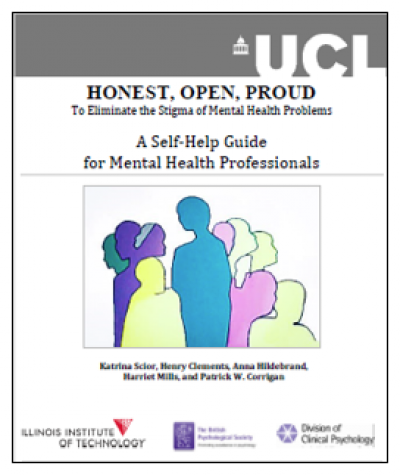Supporting mental health professionals who experience mental health problems in reaching disclosure decisions

As part of the international HOP (Honest Open Proud) network, led by Prof. Pat Corrigan, we have developed a version of HOP for mental heath professionals, in recognition of the deep silence and shame that still permeate the field when practitioners struggle with their own mental health.
For more information on HOP in general, see our editorial in the British Journal of Psychiatry.
HOP for mental health professionals (HOP-MHP) was devised by clinician researchers with the UCL Unit for Stigma Research (UCLUS). It is designed to empower mental health professionals to make decisions regarding sharing of their own experiences of mental health struggles and engage in actions that reflect their choices and values.
To date we have completed a pilot study, to evaluate our HOP-MHP self-help guide, funded by the British Psychological Society (BPS). You can read about this here.
This BPS Blog also reports on the project and the work leading up to it.
Evaluation of the HOP-MHP Self-Helf Guide (2018-2020)
Background to the project
This project follows on from two UK wide surveys we conducted in 2015, in collaboration with the Division of Clinical Psychology of the British Psychological Society and with support from 19 UK Clinical Psychology Doctoral training courses.
In the anonymous surveys of 512 qualified clinical psychologists and 348 trainee clinical psychologists two thirds said they had personally experienced significant mental health problems, either in the past or at present (Grice, Alcock & Scior, under review; Tay, Alcock & Scior, under review). Many had either not disclosed these experiences to anyone, or expressed concern about possible negative effects of disclosing to colleagues or superiors.
A picture emerged of practitioners who are mostly very empathic with service users in distress and support them through disclosure and help-seeking but themselves are often fearful of “being found out”, of being subject to unsympathetic and discriminatory responses and accordingly may go some way to conceal their own distress. Hence more action seems called for to support the large number who are experiencing poor mental health themselves.
In following up these findings, we have developed a self-help version of the innovative ‘Honest, Open, Proud’ (HOP) programme, using a community participatory approach throughout. The new HOP-MHP Self-Help guide is subject to a pilot trial starting in Sep 2017.
HOP-MHP stands for 'Honest Open Proud for Mental Health Professionals'. It is a guided self-help intervention for mental health professionals who have lived experience of mental health challenges.
HOP-MHP seeks to support them in reaching decisions around potential disclosure of their lived experience in a way that is personally meaningful, safe and empowering. Ultimately the project seeks to tackle the dichotomy of 'us and them' (providers versus users of mental health services) and to encourage more open conversations about lived experience and stigma among mental health professionals.
The self-help guide consists of three sessions
The first session asks the person to weigh the pros and cons of disclosing, and to examine potentially hurtful self-beliefs using exercises and worksheets; the second session helps them consider different contexts and levels of disclosure – from telling a friend or trusted colleague, to giving a talk in a public setting; the final session focuses on how to tell one’s story in a way that is personally meaningful and safe.
Those who decide not to disclose at this point (either at all or in some contexts) are given space to think about their decision and its implications.
Alongside completing the self-help guide, participants have access to an anonymous web-based peer forum where they can discuss their experiences related to completing the guide and their lived experiences and thoughts around disclosure and being an expert with experience more generally.
The peer forum is a closed forum that is only open to individuals completing the HOP-MHP guide and is designed as a confidential and safe space for peer support and discussion.
HOP-MHP is a pathfinder project for the Collaborative Learning Network, established as the key output of the British Psychological Society and New Savoy Conference Charter on Psychological Wellbeing and Resilience.
Next Steps
We are currently preparing a trial of an online peer support group version of HOP-MHP. This will be free and open to psychiatrists, clinical and counselling psychologists, and mental health nurses. If you would like to know more about this project please email the project lead Prof. Katrina Scior, email: k.scior@ucl.ac.uk.
 Close
Close

